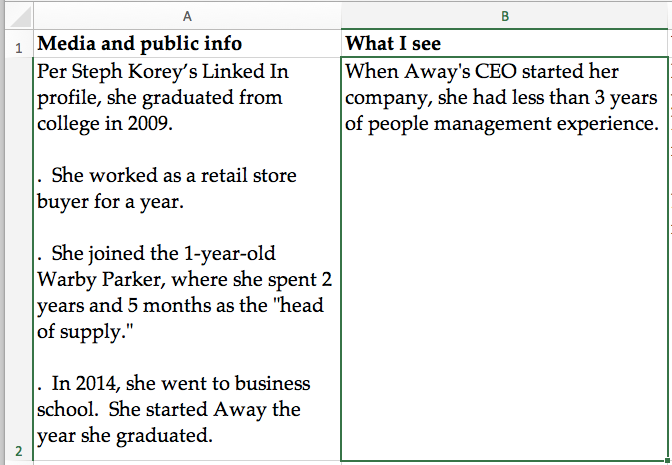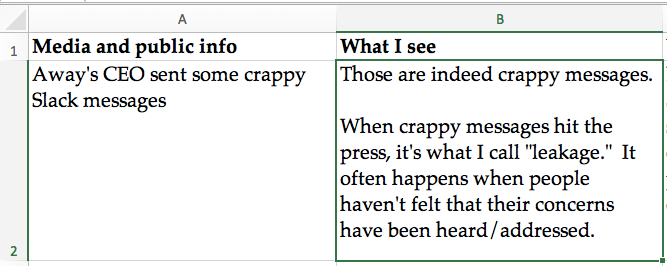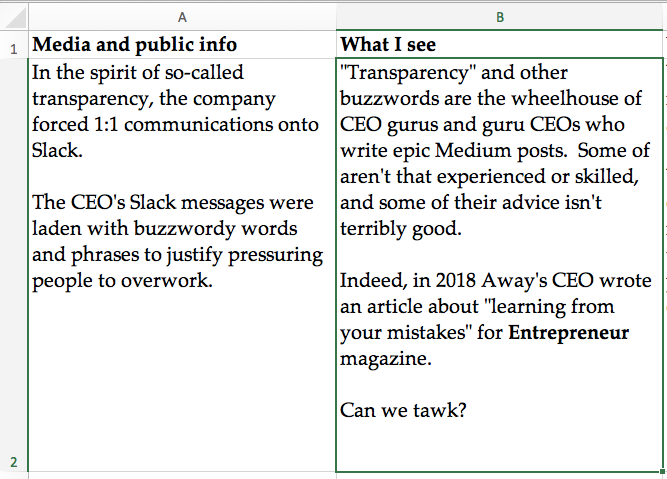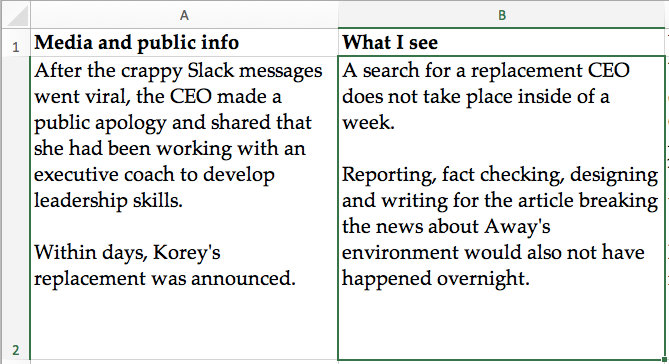Warm Take: Away with her! December 13, 2019
I have my own story about being about 30, and being tapped to lead a team that had experienced explosive growth. Everyone was tired, our customer service team had a huge backlog of work, and we were understaffed and unable to respond within reasonable timeframes.
Update, January 12: I unpaywalled this sample of my Warm Takes, periodic brief posts that I’ll send out on (some) Sunday mornings in 2020, to folks who pay to receive the newsletter.
Read on!
The leader of the CS team, “Lily,” reported to me. She was in over her head. (And tbh so was I, but that’s another story.) She had even declared periods of “mandatory” overtime, which we did bring to an end after I joined.
I’ll tl;dr this to keep this brief: had our experience happened today, my managers and I might have been dealing with social media pressure to fire Lily. Plenty of my own behavior back in the day could have landed me in hot water on the internet.
So let’s talk about the exiting-CEO of the travel bag company, and the internet controversy about what an awful manager she was two years ago, and maybe still is.

What none of us know:
- Is "Head of Supply" at a 1-year-old startup a team leader/people manager, or an individual contributor/analyst?
- Did Away's CEO have any management experience?

What none of us know:
- Did Away's CEO ever say anything nice?
- Did she ever support her employees?
- Is she objectively a rude, unpleasant person to work with any, some, most, or all of the time?

What none of us know:
- Was Away's CEO learning to manage people by reading books and Medium posts?
- How did Jen Rubio, Away’s co-founder and President, participate in these operational leadership decisions?

What none of us know:
- What does the article’s timing indicate? Was the CEO fighting to hang onto her job even as her replacement was being sought? Did the article influence board members to encourage her exit?
- How many companies are led by men who behave like this?
Look, I’m not saying that Steph Korey should be the CEO of Away.
What I’m saying is that she wound up as the CEO of Away because investors gave Korey and Rubio money to realize their idea.
During this boom in VC money, it has become a norm to invest in smart, inexperienced people. This flies in the face of common sense (imo) and research, which is starting to show that successful entrepreneurs skew older.
I coach people about management and leadership skills. But in this role, I would think long and hard before I took on an engagement to work with someone with very little experience in how organizational process works.
It’s pretty hard to swim and tread water at the same time. If you also have to learn how to swim, even harder.
Going back to Lily, she wasn’t evil. Or even mean. She was a solid manager given a stable situation. In this case, she was undersupported, and facing an unanticipated challenge she had never seen before. And she was frustrated and trying to solve the problem.
There’s a huge question about why we’re reading so much about failures and bad behavior by women in the VC-funded ecosystem, when the other 98% of CEOs are bound to be making these mistakes, too.
Seriously, for every single story about a flailing female CEO, we should be reading 49 about a CEO who is not a woman.
But that’s not how this works, is it?
Also, when you’re a young, inexperienced founder who gets VC money, there’s an even bigger question about what your role really is.
And how you can play it, well, without inflicting a lot of damage to your relationships and the well-being of the people around you.

Aaahnd, making one (last) update, the morning of January 13, 2019:
January 20: I wrote a companion piece for supporting members, in response to an email I got asking me what I thought about (seeming) developments in this story.




